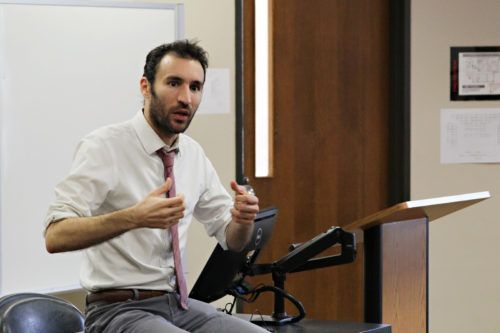Q&A with Alec Karakatsanis, Author of Copaganda
Book details how justice-related news coverage shifts focus away from policies that would help improve people’s lives

Alec Karakatsanis is the founder and executive director of Civil Rights Corps, a non-profit dedicated to fighting systemic injustice in American law. Before founding Civil Rights Corps, Karakatsanis was a civil rights lawyer and public defender with the Special Litigation Division of the Public Defender Service for the District of Columbia; a federal public defender in Alabama, representing impoverished people accused of federal crimes; and co-founder of the non-profit organization Equal Justice Under Law.
Karakatsanis' newest book Copaganda warns about how modern media coverage manipulates public perception, fueling fear and inequality, while distracting us from what truly matters; affordable housing, adequate healthcare, early childhood education, and climate-friendly city planning.
Karakatsanis defines Copaganda as a special kind of propaganda employed by police, prosecutors, and news media that stokes fear of police-recorded crime and distorts society’s responses to it. Every day, we are provided of examples of mass media manipulating our perception of what keeps us safe, contributing to a culture fearful of poor people, strangers, immigrants, unhoused people, and people of color.
What results is more and more authoritarian state repression, more inequality, and huge profits for the massive public and private punishment bureaucracy.
Copaganda is often hidden in plain sight. Examples include:
- When your local TV station obsessively focuses on shoplifting by poor people while ignoring crimes of wage theft, tax evasion, and environmental pollution
- When you hear on your daily podcast that there is a “shortage” of prison guards rather than too many people in prison
- When your newspaper quotes an “expert” saying that more money for police and prisons is the answer to violence despite scientific evidence to the contrary
The Columbia Journalism Review sat down with Karakatsanis to discuss this new book. Excerpts from the interview are included below.
*****
Where did the idea for this book come from? Why did you decide to make the news media a primary focus?
I wanted to write a book about how institutions that think of themselves as being liberal contribute to the mythologies that underlie the authoritarian turn in our society. It concerned me that punishment bureaucrats—police, prosecutors, judges, probation and parole officers, prison guards and their unions, the constellation of multibillion-dollar companies that profit off of every single stage of this system—were setting the agenda around what the problems were and who was to blame for them. I became interested in how mainstream media institutions were either ignoring or paying a lot of attention to certain kinds of issues, and what they were telling their audiences about the solutions for those problems—things like body cameras, which were pitched as a reform [despite the fact that] there’s overwhelming evidence that they don’t make police less violent or more accountable. The news was manufacturing a consensus around certain quote-unquote “reforms” that actually wouldn’t solve any of the problems that impacted the lives of my clients, but that would perpetuate and even grow the power of the punishment bureaucracy.
Can you tell me about your work trying to change the way news outlets cover crime? How have your critiques been received by journalists?
I started talking to people who train journalists, working with journalism professors and foundations. I did a talk to the New York Times editorial board. Some people were incredibly defensive and didn’t even really want to engage. I understand, emotionally; who in this busy, stressful world has time for some random person spewing their thoughts about your work? But at the same time, it’s life and death for the people that I represent: children who are unable to even hold their parents’ hands, people who are brutally sexually assaulted and physically beaten in jail, people who are lying around naked in pools of feces, blood, mucus, mold, and urine. Those people are being told that their stories are not important enough to cover. By and large, though, I was really encouraged by how many journalists engaged with me and helped improve my own analysis. There are many young reporters who didn’t sign up to work at the Washington Post or the New York Times so that they could do unhinged crime panic stories fed to them by police union sources. The book is really built from hundreds of conversations with people actually doing this work. Their insights furthered my own.
*****
You can read the full interview "Q&A: Alec Karakatsanis on the Media’s Role in Spreading ‘Copaganda’ at the Columbia Journalism Review. The mission of the Columbia Journalism Review is to be the intellectual leader in the rapidly changing world of journalism, and is an essential venue not just for journalists, but also for the thousands of professionals in communications, technology, academia, and other fields reliant on solid media industry knowledge.










